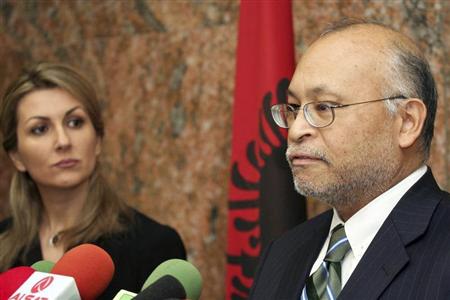U.S. prods Albania to end election commission "charade"
By Benet Koleka | Reuters
By Benet Koleka
TIRANA (Reuters) - The United States has brought its influence to bear in Albania to try to end a stalemate over reconstituting the country's electoral commission to assure free and fair voting in June.
Albania, a member of NATO, has yet to hold an election
deemed free and fair by international monitors in more than two decades
since its transition to democracy from the Stalinist rule of late
dictator Enver Hoxha.
Albania's government and opposition announced election coalitions to meet a Wednesday deadline, but said nothing about the dysfunctional Central Election Commission, prompting Washington to vent its displeasure publicly.
"In order to have a good election, you need a functioning CEC, not a CEC based on a charade. It needs to be the result of political consensus, an agreement," U.S. Ambassador Alexander Arvizu told reporters in the town of Korce on Wednesday.
With three opposition-nominated members having quit the
CEC to protest at the sacking of a fellow commissioner, the four
remaining state-appointed members cannot validate the polls.
Polarization between the two mainstream political parties,
concerns about lapses in Albanian democracy and the slow pace of reform
have stalled the country's quest to join the EU. Albania remains prone
to violence and instability.
Both the United States and EU had strongly advised the
Tirana government against firing a CEC commissioner named by a coalition
partner who later defected to the opposition.
Arvizu warned time
was running out, making it more important "for the sides to come
together and reconstitute the CEC", echoing EU calls to create
confidence in the integrity of elections in Albania.
"The pieces are all in place. No charade, just get down
to serious business, a functioning CEC....There's probably more than
one solution, but a solution is possible. We expect it to happen,"
Arvizu said.There was no immediate reaction from political parties.
The Democratic Party of Prime Minister Sali Berisha is in coalition with 24 other parties on a platform of easing high unemployment and advancing the poor Balkan state towards the EU.
The Socialist Party led by Edi Rama, which seeks to oust the Democrats from office after two four-year terms, is allied with 39 other parties in a coalition for a "European Albania".
Creating large coalitions is necessary under Albania's regional proportional system to maximize the power of each vote.
Albania was a Stalinist dictatorship from World War Two until 1990. But it enjoyed enviable rates of economic growth from the turn of the century until the crisis broke in Europe's single currency bloc, cutting into remittances from some 1 million Albanian migrants in Italy and Greece.
(Editing by Mark Heinrich)

No comments:
Post a Comment